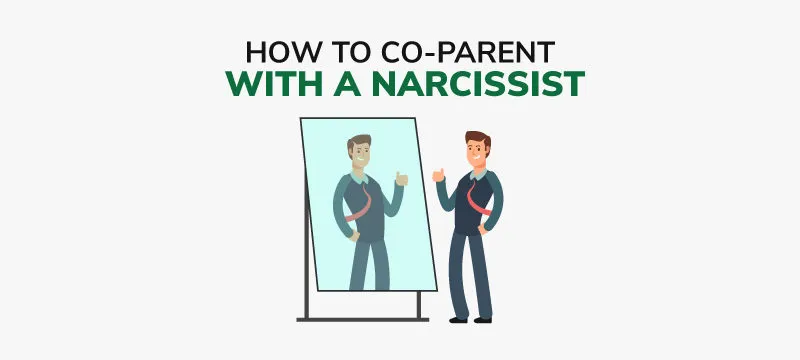Parenting brings challenges for everyone. And if you’re parenting with someone who has narcissistic personality disorder, there’s even more to navigate.
“Co-parenting with someone who has a full-blown personality disorder is extremely challenging,” says Mark Ettensohn, PsyD, author of Unmasking Narcissism: A Guide to Understanding the Narcissist in Your Life. Narcissists have a highly unstable self-image, he says. They are often inflexible, defensive, and manage the situation in unhealthy ways.
So how do you parent in a way that takes care of yourself, and your child, despite the other parent’s narcissim?
Signs That Your Co-Parent May Have Narcissism
The word “narcissist” is widely used in describing self-centered people who seem to always want to be in the spotlight. But narcissistic personality disorder is more severe than what people casually refer to.
If your parenting partner is a narcissist, they may ignore, push, or test your boundaries. Or they might parent with less structure, empathy, or respect than you’d like. They often get angry when you give them feedback or criticism. It can be hard to reach compromises. Their negativity could wear you down.
Narcissists have a strong sense of grandiosity and self-importance. That means they think they’re more important than others and lack empathy. Other signs of signs of narcissistic personality disorder include taking advantage of others, lacking empathy, needing an excessive amount of admiration, and having a sense of entitlement.
What to Do if Your Co-Parent Is a Narcissist
Take these steps if you’re co-parenting with a narcissist:
- Accept it. If your parenting partner is a narcissist, they probably won’t change. “You have to wrap your head around the fact that you’ll have to co-parent with somebody that you just might not like,” says Cat Blake, a child and family therapist working as a certified divorce coach in Boston.
- Set boundaries. Be clear and specific. Draw the line on what’s OK and what’s not. Don’t let them cross it. Narcissists like control and will strive for it.
- Make a parenting plan. Decide how to drop off and pick up kids, and how to handle after-school activities, holidays, and discipline. Agree about how you’ll talk and how often. Put the plan in writing, sign it, and stick to it.
- Limit communication. Your parenting partner may try to get your attention by over-communicating. They may suddenly tell you about something they need an answer for right away. Try using email only, so you have a chance to take a breath before you respond.
- Stay calm. When your partner lashes out or makes you angry, try to stay calm. Avoid engaging in insults or blame. “Use clear language, words without emotion, strong body language, and voice,” Blake says.
- Have perspective. Try not to take personal attacks to heart. Recognize that what they say is more about them than you.
What Not to Do
Here are some things to avoid if you’re co-parenting with a narcissist:
- Don’t argue. Narcissists make it hard to win an argument. They often talk in circles to confuse and overwhelm you. Keep your answers clear and short, without emotion. Don’t explain yourself or give too much information. This is also called the “grey rock method.”
- Don’t be afraid of them. “They thrive on fear,” Blake says. “Narcissists are so easy when you realize what makes them tick. They only want attention and kudos.” Acknowledge when they do something well. But stick with your boundaries.
- Don’t try to control everything. “As long as you do your job, try to let go a bit of what the narcissist is doing in parenting,” Blake says. That’s assuming that your child is physically, mentally, and emotionally safe, of course.
- Don’t use your child. Your child’s health and best interests come first. Don’t involve them in any conflict between the parents.
How to Protect Kids
“It may be hard to protect kids from a co-parent’s personality issues when you’re not there to see what’s happening,” Ettensohn says. Focus on what you can control.
Talk to your child. Help them understand their other parent’s behavior. Keep these discussions age-appropriate. Teach your child that their parent’s behavior is about that parent, not them.
Watch what you say. Try not to say negative things about your parenting partner. “It can turn your child against you and they might feel obligated to pick sides,” Ettensohn says. This tip also includes your nonverbal communication and things your child might overhear you saying to friends or family, Blake notes.
Watch for signs of abuse. Look for anything that crosses the line into physical, sexual, or emotional abuse.
Be a healthy parent. Be a good role model for your child. Coach and support them. “The antidote to your partner’s narcissism is acceptance, warmth, realistic appraisal, and consistency,” Ettensohn says.



